MIT Lesson 30A Kanji: 第30A課の漢字
 Warning! There is Japanese text on this
page. If it looks like this: $BI4@i instead of this: "
Warning! There is Japanese text on this
page. If it looks like this: $BI4@i instead of this: " ", then read this.
", then read this.
 Athena users - for instructions on how to
print this page, read
this.
Athena users - for instructions on how to
print this page, read
this.
In the following definitions, on (Chinese-based) readings
are represented by katakana, and by capital romaji letters; kun
(native Japanese-based) readings are represented by hiragana, and by
lower-case romaji letters. This is a common dictionary convention, and
does not have any bearing on meaning.
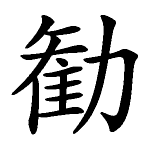
Printed form:
勧
Readings:
カン
すす(める)
Meaning:
to urge
- Usage Examples:
- スポーツを勧める
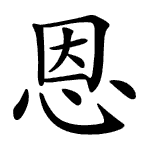
- Printed form:
- 恩
- Readings:
- オン
- Meaning:
- debt of gratitude
-
- Usage Examples:
- 恩を受ける
恩を返す to return a favor
恩人(おんじん)benefactor
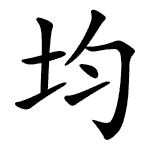
- Printed form:
- 均
- Readings:
- キン
- Meaning:
- even
- Usage Examples:
- 平均的な
平均年齢(ねんれい)average age
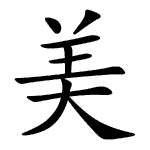
- Printed form:
- 美
- Readings:
- ビ
- ミ
うつく(しい)
- Meaning:
- beautiful
- Usage Examples:
- 美しい景色(けしき)
美人(びじん)
美容院(びよういん)beauty parlor
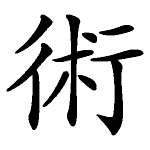
- Printed form:
- 術
- Readings:
- ジュツ
- Meaning:
- technique, skill
- Usage Examples:
- 美術(びじゅつ)fine arts
芸術(げいじゅつ)art
手術(しゅじゅつ)surgical operation
技術(ぎじゅつ)skill, technique
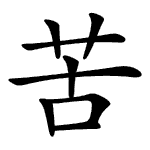
- Printed form:
- 苦
- Readings:
- ク
くる(しい)
にが(い)
- Meaning:
- suffering, hardship, bitter
- Usage Examples:
- 苦しい
この果物は苦い(にがい) bitter taste
苦労(くろう)する to have a hard time, to go through hardship
苦痛(くつう)agony
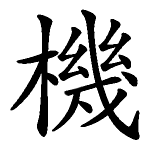
- Printed form:
- 機
- Readings:
- キ
- Meaning:
- machine, opportunity
- Usage Examples:
- 両替機(りょうがえき)
機会(きかい)がある to have an opportunity
自販機(じはんき)a vending machine
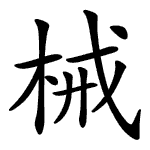
- Printed form:
- 械
- Readings:
- カイ
- Meaning:
- mechanical device
- Usage Examples:
- 機械
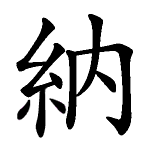
- Printed form:
- 納
- Readings:
- ノウ
- ナツ
おさ(める)
- Meaning:
- to pay, to accept
- Usage Examples:
- 納得する
授業料を納める to pay tuition
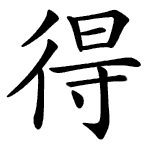
- Printed form:
- 得
- Readings:
- トク
え(る)
- Meaning:
- to acquire, to gain, to compare
- Usage Examples:
- 得をする to profit
得意な科目(かもく)
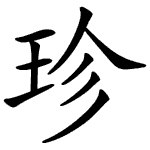
- Printed form:
- 珍
- Readings:
- チン
めずら(しい)
- Meaning:
- rare, unusual
- Usage Examples:
- 珍しい
珍味(ちんみ)
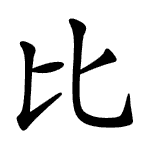
- Printed form:
- 比
- Readings:
- ヒ
くら(べる)
- Meaning:
- to compare
- Usage Examples:
- 比べられた
比べ物にならない
比較的(ひかくてき)relatively
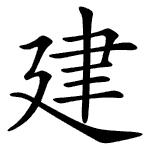
- Printed form:
- 建
- Readings:
- ケン
た(てる)
- Meaning:
- to build
- Usage Examples:
- 建物
ダムを建設(けんせつ)する to construct
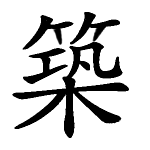
- Printed form:
- 築
- Readings:
- チク
きづ(く)
- Meaning:
- to construct, to erect
- Usage Examples:
- 建築家
新築(しんちく)の家 a new construction
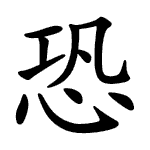
- Printed form:
- 恐
- Readings:
- キョウ
おそ(れる)
- Meaning:
- fear, to be afraid of
- Usage Examples:
- 恐ろしい夢を見た
どんなことも恐れない
恐怖感(きょうふかん)sense of fear
恐縮(きょうしゅく)
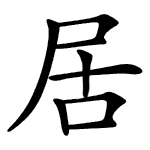
- Printed form:
- 居
- Readings:
- キョ
い(る)
- Meaning:
- to reside, to dwell
- Usage Examples:
- 居住(きょじゅう)する to live, to dwell
住居(じゅうきょ)house, residence
同居する(どうきょ)to live together
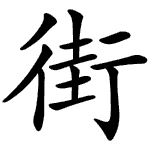
- Printed form:
- 街
- Readings:
- ガイ
- カイ
まち
- Meaning:
- city quarter
- Usage Examples:
- 街角(まちかど)でよく見る street corner
地下街(ちかがい)underground shopping center
住宅街(じゅうたくがい)residential quarter
日本人街
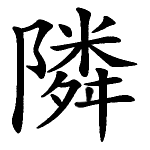
- Printed form:
- 隣
- Readings:
- リン
となり
- Meaning:
- neighbor, adjoining
- Usage Examples:
- 隣の席
隣国(りんこく)
隣人(りんじん)
[Japanese
6 Kanji] [Japanese
6]
![]() Warning! There is Japanese text on this
page. If it looks like this: $BI4@i instead of this: "
Warning! There is Japanese text on this
page. If it looks like this: $BI4@i instead of this: "![]() ", then read this.
", then read this.![]() Athena users - for instructions on how to
print this page, read
this.
Athena users - for instructions on how to
print this page, read
this.
















